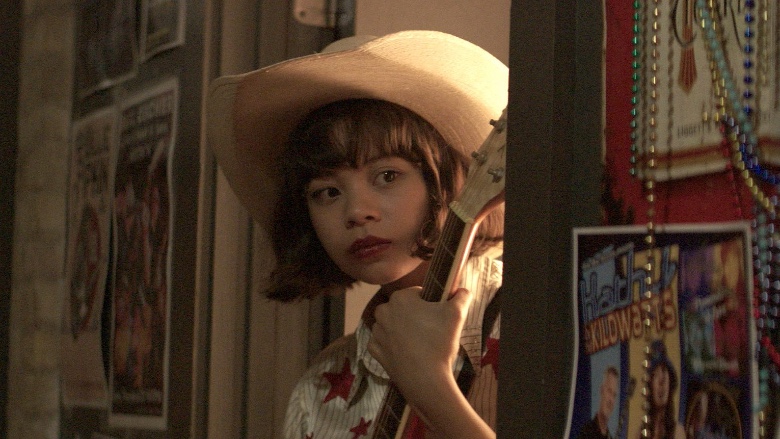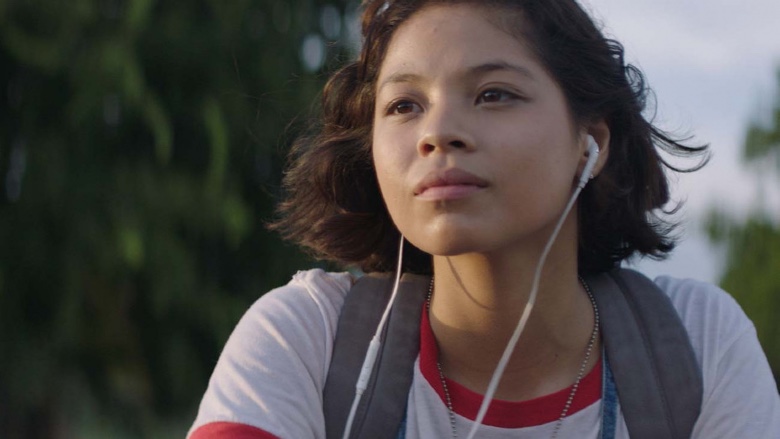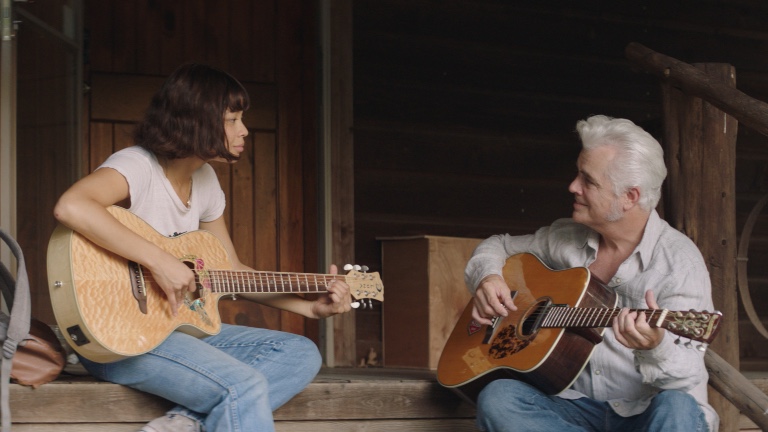
2020 has been quite a year for the movie business, both from the production side but also theatrical and distribution, as COVID-19 has changed much of the way we both make and watch movies, hopefully not forever but for a good amount of time.
Here at Below the Line, we would love to end this crappy year on a positive note, and that’s why we’re shining our spotlight on some relatively newer talent that emerged in 2020 and one of the films that maybe didn’t get the attention it should have, made by a filmmaker who is definitely going places.
Diane Paragas’ Yellow Rose was on the film festival circuit in 2019 where it won a number of audience awards, and it was picked up by Sony who gave it an ambitious theatrical release in October. It stars Eva Noblezada (from the Broadway shows Miss Saigon and Hadestown) as 17-year-old Rose Garcia, a young Filipina from Texas who has a knack for writing country songs, even though she’s not as keen about performing them for people. As she continues to explore her dreams of being a country star, Rose’s mother (Lea Salonga) is taken away by ICE with threats of being deported, and Rose is forced to find her way in a world mostly on her own but with a few friends she meets on the journey.
Yellow Rose is a very different type of coming-of-age film, and once you watch it, you immediately realize why festival audiences (and everyone else who has seen it) has fallen in love with Rose’s journey, and some of the wonderful songs she performs in the film.
Below the Line spoke with Ms. Paragas over the phone for the following interview:
Below the Line: I was reading through your resume, and you’ve really done some amazing stuff over the past ten years. Was Yellow Rose something you’d been developing and wanting to make for a long time?
Diane Paragas: Oh, yeah, definitely, definitely. It was one of those movies that I’ve been wanting to make as long as I even started thinking about making movies. It just took a really long time to convince financiers to make it. What’s kind of interesting is that in the meantime, I became a documentary filmmaker. I’ve always wanted to do a scripted project, and then I found myself making documentaries, and then eventually doing commercials. All these years later, when I finally got the financing together, I’m back to scripted, and it’s just been a joy. I think all of my experiences in other kinds of filmmaking, I think really helped helped me prepare for making this movie.

BTL: You were kind of lucky because your movie ended up doing an entire film festival run last year, since very few film festivals happened this year. I’ve talked to a few filmmakers who haven’t had a chance to watch their movies with an audience or even on a screen yet.
Paragas: It’s interesting. The pandemic just hit so many of us in the film community in different ways. I am so grateful I got the chance to watch the film with so many different audiences. We had a fairly successful festival run — we won a lot of awards. What was sad was that we released our film theatrically, and nobody went, because nobody was going to theaters. We were in 900 theaters in October and nobody went, and there were record low numbers for every movie. In a way, it was sort of bittersweet in some sense. I know a lot of people who’ve had their film in festivals that year, and don’t know when they’re going to be releasing their film or still having trouble finding homes for them, because typically, you sell it at festivals, but a lot of that is because of the audience’s reaction and stuff, which we don’t have anymore. It’s just been a tough time for all independent film, but I think we’re starting to come out of it. I’m really thrilled that we’re finally on digital starting today, and I do hope that a lot of people who’ve been wanting to see it finally get to see it.
BTL: It’s been bad, but independent movies have been able to get a lot more attention just because there’s not as many blockbusters that usually take up those screens, although there’s also a lot more choices of stuff to see.
Paragas: That’s so true. I think we would never have been in 900 theaters if we launched in a normal year. The fact that we were in so many theaters was really great, but we weren’t in New York or LA. The film definitely got some more attention, I think, because there was just not a lot coming out. It’s true.
BTL: Although I have a lot of questions about working with your heads of department and such, I do want to ask about finding Eva. I know she had a pretty extensive Broadway career, but how did you know that she could sing country?
Paragas: [laughs] You know what’s funny? That is such a good question, because I cast her without auditioning her after I saw her in Miss Saigon. It’s funny, because when we were doing the readings, I was like, “Oh, my God, I have no idea if she can do country music.” Because she was so great in the film, and because I had long conversations with her, I knew that she was such a talented human being not just as a musician, but an incredible actress. Luckily and thankfully, she really just picked it up. We worked a lot with Dale Watson, who’s in our film and is just a country legend. He worked with her to kind of school her on the ways of singing and guitar playing. In general, the film was very much kind of home-cooked by just a bunch of really great artisans, a lot of our cast and crew were local to Austin where we shot. That actually helped inform the music and the feeling and the vibes that we were able to get.

BTL: Did you have most of the songs written while you were developing the script? Obviously, you must have had them before making the film.
Paragas: Like a lot of movies, we did a short film prior to doing a feature a couple years before. Two of our big songs that were in the feature were written during the time we shot the short, which was “Square Peg” and “I Ain’t Goin’ Down,” and then the other songs were written either between shooting where Dale Watson, who was attached from the short onto the feature, was writing songs while waiting to do the feature. We’ve even performed some of those songs like “Circumstance” on the road. He had been performing “Circumstance” for audiences before we used it in the film, but he based it on a line that was cut from the film. Interesting that you say that. Another song in the film, “Quietly into the night,” is actually a song I wrote on set. I wrote that song while we were shooting, because I felt like we needed another song. I was writing it as we went. At night, when I would go home, I would play around with the lyrics and the song. By the last week of shooting, I had the final song. We recorded it on the last day of shooting in Dale’s studio, and it ended up being like a pretty big song in the film. By that point, I’d worked a lot with Dale, and I was just like living in the moment of the film. It was really cool to create a piece of music just with all the ingredients together. I knew what Eva sounded like, I knew where I wanted to fill the song to go in the film, and to create that while shooting was a really cool thing. It’s sort of a wonderful memory.
BTL: For an indie movie, you have a lot of locations. How did you manage all of that, since I imagine you didn’t have a huge, huge budget?
Paragas: Tiny budget. Called in a lot of favors. Shot the film in 19 days, so we didn’t have a lot of time. We shot on a single camera, which is unusual for a music film and difficult for a music film. Also, a couple of months later, we even shot in the Philippines. So there’s even a tiny scene that’s in the Philippines itself. It was a lot of Dale. I have to give it to Dale Watson, who is a producer as well as actor and a musician in the film. A lot of those locations were places he plays, places he’s in good favor, we’d shoot his gig sometimes — we shot in his house. We shot and recorded in his studio — we did all the music in the studio in his house. [laughs] That was kind of how we made the film. We just were kind of a very, very small, scrappy crew, and we just got it done. I wanted to film to kind of have that sort of immediacy and intimacy. We were just kind of winging it and just going in and shooting. Sometimes, I’d write scenes because other locations would drop out, or even if I just liked what was happening, I’d just write new stuff, and we would do it on the day. My background with documentary filmmaking was very useful in terms of shooting the way we did on this film. I think it’s also just how I am as a director. I’m very kind of in the moment. You heard. I even wrote a song during the shoot. I’m very much like I find the magic in the moment when you have all the ingredients together.
BTL: How did you work with your DP as far as shooting? Did you do storyboards and shot lists and stuff like that?
Paragas: No, not at all. The approach, and he’s an incredible cinematographer, August Thurmer. He’s done a ton of work in commercials and documentaries, but this was his first feature. We kind of would do a really quick run-through with the actors in the location. I just wanted them to have the freedom to play the scene where they felt comfortable, and then we would light to what I thought was the strongest performance. Ten minutes before we’re starting to light, I would do this little thing where we would light around where it felt natural to the scene. That’s kind of how we did it. We shot the entire film handheld, including the process trailer – he’s holding the thing, sitting on a stool. Even the process trailer shots were handheld. I just wanted the entire thing to feel like we’re kind of like a fly on the wall watching this entire story take place.
BTL: I like that the whole film feels so naturalistic and that even comes down to the costumes. Did the actors chime in on what they wanted to wear and there was some collaboration in that respect?
Paragas: Kind of. Yes, and no. We did have an incredible Costume Designer, Amanda Hall, and she is from Austin, and she grew up two-stepping, but she works out in L.A. She definitely gave the film its look. As you might know, in Austin, there’s these hipsters, and there’s this cool Austin country scene where a lot of young people have a certain style, and that was what we were playing into for both Rose and Elliot. And then Dale, that’s his own stuff. We just went into his wardrobe, and we didn’t have to do much with him. We had a really incredible costume designer, and I was very involved in that too, just picking the color palette and the look of the film and the costumes.

BTL: Are you based in Austin?
Paragas: No, I’m based in New York, but I grew up in Texas, and I went to UT. It was kind of like the rich current of my younger days, but I’m a Texan, so I grew up in Texas, and it definitely was in me, and it was based sort of loosely on me growing up in Texas.
BTL: I was curious how Sony got involved. Was this something they discovered on the festival circuit?
Paragas: Actually, Sony was tracking on us really early on. They had looked at a very early cut of the film and were tracking us from the beginning. We were very lucky. We won a bunch of consecutive film festivals in a row, and I think we had won 10 festivals in a row or something like that, and at that point, Sony said, “I think we should buy this movie.” [Laughs] We announced at the Austin Film Festival that we were being acquired by Sony at that point. That was our Austin premiere, so that was about a year ago that happened, and we had to wait another year before we premiered the film, but that’s how it happened.
BTL: I feel like the movie would work anytime. Obviously, as a filmmaker, you want to get it out there, but I think it works just as well now as it would have if released last year.
Paragas: I hope so. I think so.
BTL: Are you still working on documentaries right now? Are you in the middle of doing anything during the pandemic?
Paragas: I have two films that I’m in pre-production for, and a couple of other projects, which I’ve been attached to since the pandemic. The script I’m writing right now is called Lizards, and it’s a magical realism film that takes place in World War II in the Philippines, and it follows this young girl who eventually becomes a guerilla. I’m writing it as a pop music opera, so it’s a very, very ambitious film, but I have gotten quite a bit of interest in it from some big producers, so that hopefully will be one of my next films. Then I’m working on a project with Scooter Braun, who is producing with Eric Feig and from Picture Start. I’m also doing a project with Atlas Entertainment that did Wonder Woman, and then I’m beginning work on a television show, which I’m directing the pilot and executive producing for Sony Television. I have a documentary that was at the Sundance Labs, and I won the creative capitol grant for this year called, The Three Lives of David Wong. It’s an experimental film that follows a young Chinese man, who was wrongfully accused of murder. He spent 15 years exonerating himself, but I’m telling that story through live-action puppetry. So it’s a very visually interesting. project. I’ve got a lot of things going on, but that one was in the Sundance Labs, and we actually started shooting it, and we’re starting to come back to it. We were meant to shoot this summer, but of course, that didn’t happen. I’ve kind of moved a bit more into the scripted area, but documentaries, I’ll always come back to them. I consider it all storytelling.
BTL: Definitely sounds like you’re not making things easy for yourself by making another small movie. You’re swinging for the fences, as they say.
Paragas: I’m definitely swinging for the fences. It’s a very ambitious project, but I’m very excited about it. It’s something I’ve been working on for a while as well, but kind of picked it back up again before the pandemic. I’ve written it as a straight drama, but over the pandemic, I started writing more music and I think because of Yellow Rose, music has really come back into my life in a really big way and certainly in my filmmaking. The project with Scooter Braun is also a music film, so it’s just becoming part of who I am, I guess, and so I turned it into a music opera because I started writing these songs for it, and it kind of made sense for all the different things I was trying to achieve in the idea of it. I’m excited about kind of going even deeper into what a cinematic musical looks like that’s not just a translation of a Broadway play, but something that’s created for cinema. Yeah, so there’s a lot of big ideas. It’s a big movie, big idea, but I’m swinging for the fences. You’re absolutely right.
BTL: Well, I love Yellow Rose, and I’m excited to see what you do next. It’s funny, because the Philippines really haven’t been covered much in terms of WWII even though it was in the center of it.
Paragas: No. Absolutely, and that’s another reason. It’s a part of American history that people don’t really know much about, and certainly, a movie about WWII from the perspective of an Asian woman has not really been done either. I think for both of those reasons and certainly not as a pop music opera. I think for all those reasons, I’m very excited about that project.
Yellow Rose is now available on Digital/On Demand and will be available via Blu-Ray, DVD on Tuesday, January 5.
All pictures courtesy of Sony.





